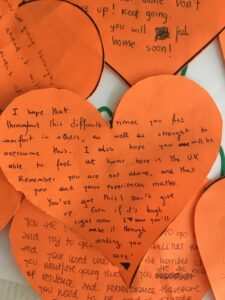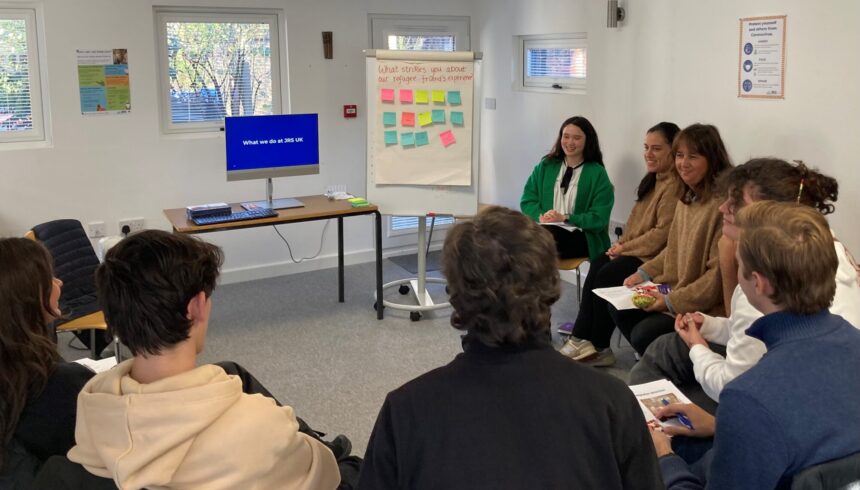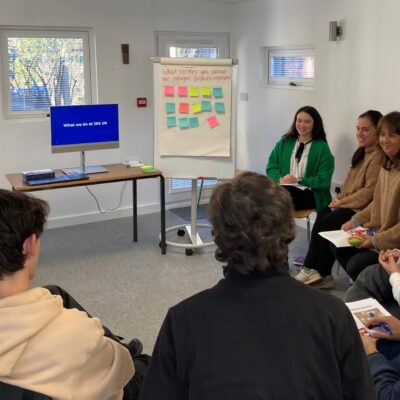At the beginning of February, we were visited by two sixth form groups from Colegio Seminario, a Jesuit school in Montevideo, Uruguay. A first, smaller, group of seven visited us after attending a Model United Nations meeting in the Netherlands. We were then visited by 27 of their classmates who had just spent two weeks at Stonyhurst College, a Jesuit school in Lancashire with whom they have long-standing ties. We are very honoured that the students and teachers made time to visit us at JRS UK to learn about the asylum system in the UK and the work we do.
“The UK is much less humane than I initially thought”
The young people articulated powerful contributions to our lively exchange around the issues facing refugees in our current climate. They empathised with the difficulties faced by those who are displaced by war or persecution, and the hardship it entails to lose your community and your home, full of fear and concern about the future, often without ID and documentation.
Together, we considered the differences in our own associations with refugees and asylum seekers, the highly flammable language we see used by the government and in press coverage, and in official legal definitions. The students discussed the power of language, and how the way it is used can affect how people are seen and treated, how misinformation can lead to scapegoating and, as we’ve seen in recent months, very real and dangerous attacks on people seeking safety. The students also had questions about the nuances of the legal definitions and who therefore is able to receive protection.
We read testimonies from our refugee friends and the challenges that many of our refugee friends face, such as destitution, homelessness, forced separation from communities of support, and immigration detention. The students were shocked by the culture of hostility and disbelief those who arrive in the UK are met with. The Seminario students questioned how someone could be kept in destitution for decades, why refugees are needlessly asked to move around the country, and the lack of support available for asylum seekers. One student reflected: “what strikes me is how the legal system, something created to protect, does quite the opposite.”
“We’ll receive you in Uruguay”
In contrast, the students spoke about how, throughout its history, Uruguay has experienced massive waves of immigration from all around the world, specifically from the European continent, and today 90–95% of the Uruguayan population has European ancestry. In contrast to the UK, it is probably one of the easiest countries in the world in which to immigrate and obtain residency. Following the outbreak of war in Syria, they welcomed many Syrians with a positive reception, integration and outcomes. Recently they have welcomed many Venezuelans and Cubans, which, the students say, has enriched their culture even further, though it is often hard for professionals to practise their profession in the new country due to differing legal systems, and they therefore have to take on less skilled work than they previously carried out.
“I hope that the refugee friends of JRS and all over the world know there are people who care and pray for them”
Considering the differences in welcome and asylum processes in the UK and Uruguay, the students reflected on the importance of accompaniment – a core JRS value – using their own volunteering experiences as a starting point.
Specifically, in this Montevideo school, the students have the opportunity to commit to volunteer work on Saturdays in a structured way, whereby each year in a gradual process, each group becomes responsible for a different service. This aims at helping them in their growth in maturity and responsibility and fosters an open and committed attitude towards those in need. The services the young people work in include construction of housing, parish-based soup kitchens, and accompanying the elderly.
The students identified accompaniment as a central part of all of their volunteering work and hospitality. It “makes you feel human,” one student reflected, “it is important to show people that they have a place, that people care for them and don’t just see them as a problem to be solved.” We discussed how this can help with wellbeing and confidence, especially in an environment which is purposefully designed to be hostile and to render people invisible. Sitting and having a coffee with someone, chatting about hobbies or a favourite football team, however small an action, can “make people feel human. It’s a process of humanisation, dignification.”
“I believe loneliness is one of the worst feelings, so that’s why accompaniment is crucial, and equally as important as donating, is accompanying. You can accompany by just talking and making others feel human.”
We were struck by the sensitive, mature and caring attitude of these young visitors from Uruguay and conclude that much is thanks to their opportunity to volunteer in a stable, structured way from a young age. One student astutely observed that voluntary work and accompaniment “is important not only for the person you are accompanying but also for you…. [accompaniment] helps to construct community and a sense of home.”
The Red Jesuita con Migrantes, a network of the Society of Jesus which seeks to collaborate at the continental, regional, and interprovincial levels in Latin America to support migrants and those in situations of refuge or displacement have moved into the Colegio Seminario school grounds, and we look forward to hearing about students’ experiences of this going forward.
We would like to thank Colegio Seminario again for their visit and for being so engaged and eager to take part in discussion, and for the messages of encouragement they left with us. They were encouraged and amazed by the fight of JRS to accompany, serve and advocate for so many despite receiving no help from the government, and the students have expressed their intention to speak about these issues with their classmates back in Uruguay, and to keep learning more. One student commented with the clear-sighted vision of youth: “We have the hands to make our world better day by day”.




